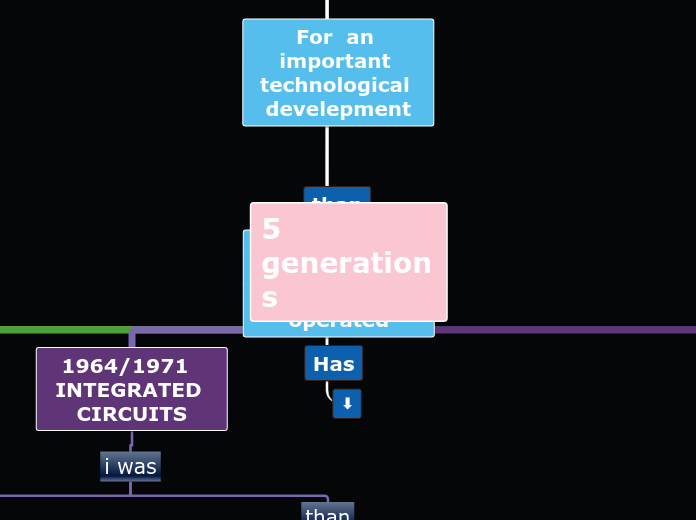5 generations
1940 / 1956 VACUUM TUBES
Were
The first computer system, usted vacuum tubes forma circiuts and magnetic drums for memories
the first generations depends on a machine lenguage the only answers one problem at a time
which
it would take several days or even weeks to set up a new programing
Example
UNVAC
I was
The first comercial computer un the united states in 1951
ENIAC
which
they were huge they took up whole roms
Use a lot of energi
operations was very expensive
they generated a lot of heat
1956\1963 TRANSISTORS
They
Replaced the vacuum tubes in the second generations
I know
Invention at bell las un 1947
But
I was not widely used i computer until the late 1950
Were
far superior to vacuum tubes allowing computer to be smaller cheaper and more efficient
too
they used punch cards to gef in and out
even if
generated a lot of heat that damages computer
but
were a huge improvenent aver vacuum tubes
and
weredeveloped for the atomic energy industria
1964/1971 INTEGRATED CIRCUITS
i was
transistors are minimized and place sack cloth chip
they were called semicinductors
than
dramatically increased the fuzziness on efficiency of computer
i am a central program that controls memory
the
Usersinteract with 3 geneagenerations computer through key keyboard and monitor
Too
Hace integrated circuits that are small devicedevicet madre of semiconductor material
The first circuits was developed un the of 1950
For
Jack killby
Robert noyce
1971/Present MICROPROCESSORS
this
brought the 4 generations with thousands of integrated circuits and a single chip of sackcloth was formed
Which it's
Was previously occupied a room new fits in the palm of your hand
some progress were
The intel 4004 chip deeveloped 1971
In 1981 IBM introduced the first computer
In 1984 apple introduced the macinthos
Powerfull computer and internet development
Development of mouse , GUI and other services
present /more there ARTOFICIAL INTELLIGENCE
these
A-i based devices are still in development
Which it's
have quantum molecular and nanotechnologr radically changed
too
devices responsive to natural language input being developed
Advances
Sealing
memories
Operating systems
How
MAC
LINUX
UNIX
Flooppy disk
Expert systems
